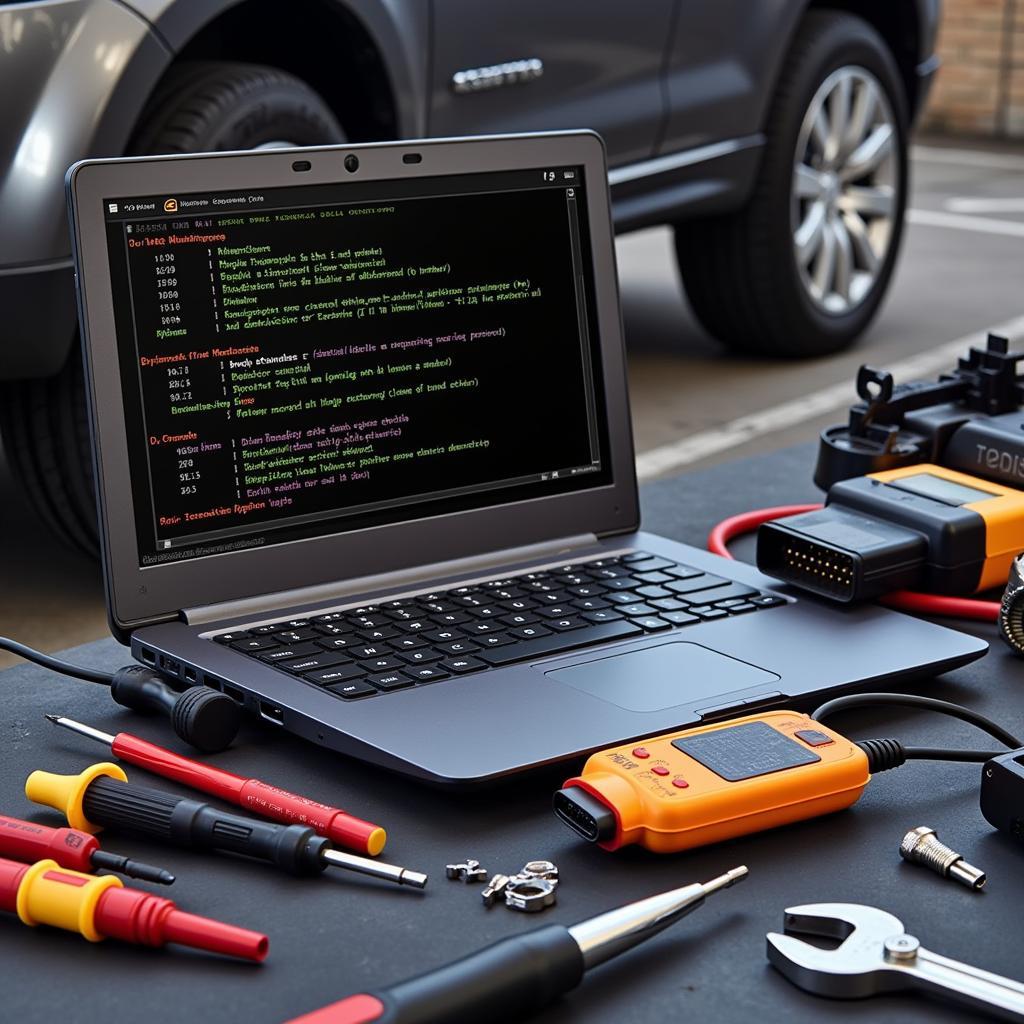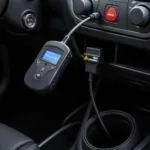Cars diagnostic plays a vital role in modern vehicle maintenance and repair. From identifying a simple sensor malfunction to pinpointing complex electronic issues, car diagnostic tools and techniques have become indispensable for mechanics and car owners alike. This article delves into the world of cars diagnostic, exploring its importance, the technology involved, and how it empowers you to keep your vehicle running smoothly.
Understanding the Power of Cars Diagnostic
Gone are the days of relying solely on mechanical expertise and intuition to diagnose car problems. With the increasing complexity of modern vehicles and their reliance on sophisticated electronic systems, cars diagnostic has emerged as a game-changer. By connecting specialized tools to your car’s onboard computer, mechanics can now access a wealth of data that provides invaluable insights into your vehicle’s health and performance.
Think of cars diagnostic as a window into the intricate workings of your car’s brain. This technology allows mechanics to:
- Read and interpret Diagnostic Trouble Codes (DTCs): When something goes wrong with your car, the onboard computer generates specific codes that pinpoint the potential source of the problem.
- Monitor real-time sensor data: From engine temperature and fuel pressure to emissions levels and airbag systems, cars diagnostic provides access to a live stream of information about your car’s vital signs.
- Perform actuator tests: These tests help determine the functionality of various components, such as injectors, solenoids, and motors.
- Program and reprogram electronic modules: As car software becomes increasingly sophisticated, cars diagnostic enables mechanics to update, reprogram, or configure various control modules.
The Evolution of Cars Diagnostic: From Basic Scanners to Advanced Software
Cars diagnostic has come a long way from the early days of rudimentary code readers. Today, a wide range of tools and technologies cater to the needs of both DIY enthusiasts and professional mechanics.
- OBD-II Scanners: These handheld devices are widely available and allow users to read and clear basic DTCs.
- Professional-Grade Scan Tools: Mechanics rely on advanced scan tools that offer comprehensive diagnostic capabilities, including bi-directional communication with vehicle systems, specialized tests, and access to manufacturer-specific data.
- PC-Based Diagnostic Software: By connecting a laptop or tablet to the car’s diagnostic port, mechanics can utilize sophisticated software to perform in-depth analysis, access wiring diagrams, and even program electronic modules.
The Benefits of Proactive Cars Diagnostic
While cars diagnostic is crucial for troubleshooting problems, it’s also an invaluable tool for proactive vehicle maintenance.
- Early Detection and Prevention: Identifying potential issues before they escalate can save you time, money, and potential headaches down the road.
- Improved Fuel Efficiency: By ensuring all systems are functioning optimally, cars diagnostic can help optimize fuel economy.
- Enhanced Safety: Monitoring critical safety systems like airbags, ABS, and traction control ensures they are in peak working condition.
- Increased Resale Value: A well-maintained vehicle with a documented service history, including regular cars diagnostic checks, holds a higher resale value.
Navigating the World of Cars Diagnostic: What to Expect and How to Choose the Right Tools
For car owners, understanding the basics of cars diagnostic can empower you to communicate more effectively with mechanics and make informed decisions about your vehicle’s maintenance.
- Ask for a Diagnostic Report: When taking your car for service, request a detailed diagnostic report that outlines any DTCs found, along with their descriptions and potential causes.
- Do Your Research: Familiarize yourself with common car problems and their associated DTCs.
- Consider DIY Scanners: For basic diagnostics and code reading, affordable OBD-II scanners can be a worthwhile investment for car enthusiasts.
The Future of Cars Diagnostic: Embracing Innovation and Connectivity
As technology continues to advance, the future of cars diagnostic promises to be even more integrated and insightful.
- Remote Diagnostics: Imagine receiving real-time diagnostic alerts on your smartphone, allowing you to monitor your car’s health from anywhere.
- Predictive Maintenance: Advanced algorithms will analyze diagnostic data to predict potential failures before they occur, enabling proactive maintenance and minimizing downtime.
- Augmented Reality: Mechanics will use augmented reality headsets to overlay diagnostic information onto their real-world view, simplifying complex repairs and improving efficiency.
By embracing cars diagnostic, you gain a deeper understanding of your vehicle’s health, empowering you to make informed decisions about its maintenance and repair. Whether you’re a DIY enthusiast or rely on professional mechanics, cars diagnostic is an essential aspect of modern car ownership.
FAQ
1. What is the OBD-II port and where can I find it in my car?
The OBD-II port, also known as the diagnostic port, is a standardized 16-pin connector found in most cars manufactured after 1996. It’s typically located under the driver’s side dashboard, near the steering column.
2. Can I use any OBD-II scanner on my car?
While most OBD-II scanners can read and clear basic DTCs, some vehicles may require scanners with manufacturer-specific capabilities for more advanced diagnostics.
3. Is it worth investing in a professional-grade scan tool for DIY use?
Professional-grade scan tools offer comprehensive features but can be expensive. For most DIY car owners, a quality OBD-II scanner is sufficient.
4. How often should I get a car diagnostic check?
It’s generally recommended to have a car diagnostic check performed at least once a year or as part of your regular maintenance schedule.
5. Can cars diagnostic detect all car problems?
While cars diagnostic is a powerful tool, it may not detect all mechanical or electrical issues. Physical inspections and other diagnostic methods may be necessary in some cases.

